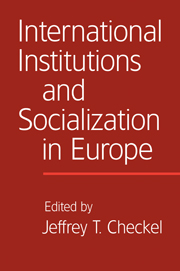Book contents
1 - International Institutions and Socialization in Europe: Introduction and Framework
Published online by Cambridge University Press: 06 November 2009
Summary
Is Europe different? For many theorists, policy analysts, and politicians, the answer is obvious: “Of course!” Europe's degree of integration, level of political community, and pooling of sovereignty far outstrip those seen anywhere else. If there is any place in the world where the nation-state would seem to be in retreat, it is in Europe. Moreover, recent years have witnessed a seeming acceleration of the continent's “specialness.” A common currency has been successfully introduced, a constitutional convention held, and a (supranational) constitution is now being discussed and debated. This all looks and sounds more like federalism and supranational polity building than the anarchy and Westphalian system that have so fascinated theorists of international politics over the centuries.
As with many headline stories, this one, which emphasizes Europe's sui generis nature, is overstated. Yet, as most would admit, there is something to it; Europe is different. Contributors to this volume do not so much disagree with this claim as approach it from a different angle. Leaving the scripting of headlines to others, we are—to continue the journalism metaphor—the investigative reporters, working down in the trenches, exploring the how and why.
Europe is thus our laboratory for getting at some bigger issues concerning the relation of institutions, states, and individuals. When do international institutions create senses of community and belonging? If and when this happens, what does it mean for individual and state allegiances, interests, and identities? What processes underlie such transformative dynamics?
- Type
- Chapter
- Information
- Publisher: Cambridge University PressPrint publication year: 2007
References
- 12
- Cited by

